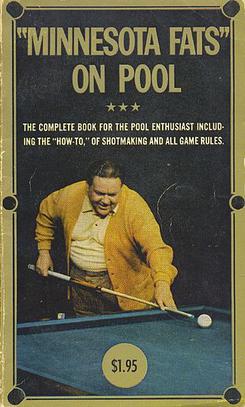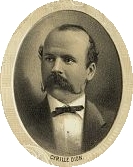
Cue sports are a wide variety of games of skill played with a cue, which is used to strike billiard balls and thereby cause them to move around a cloth-covered table bounded by elastic bumpers known as cushions. Cue sports are also collectively referred to as billiards, though this term has more specific connotations in some varieties of English.

Eight-ball is a discipline of pool played on a billiard table with six pockets, cue sticks, and sixteen billiard balls. The object balls include seven solid-colored balls numbered 1 through 7, seven striped balls numbered 9 through 15, and the black 8 ball. After the balls are scattered with a break shot, a player is assigned either the group of solid or striped balls once they have legally pocketed a ball from that group. The object of the game is to legally pocket the 8-ball in a "called" pocket, which can only be done after all of the balls from a player's assigned group have been cleared from the table.

Nine-ball is a discipline of the cue sport pool. The game's origins are traceable to the 1920s in the United States. It is played on a rectangular billiard table with pockets at each of the four corners and in the middle of each long side. Using a cue stick, players must strike the white cue ball to pocket nine colored billiard balls, hitting them in ascending numerical order. An individual game is won by the player pocketing the 9 ball. Matches are usually played as a race to a set number of racks, with the player who reaches the set number winning the match.

English billiards, called simply billiards in the United Kingdom and in many former British colonies, is a cue sport that combines the aspects of carom billiards and pool. Two cue balls and a red object ball are used. Each player or team uses a different cue ball. It is played on a billiards table with the same dimensions as one used for snooker and points are scored for cannons and pocketing the balls.

William Joseph Mosconi was an American professional pool player from Philadelphia, Pennsylvania. Mosconi is widely considered one of the greatest pool players of all time. Between the years of 1941 and 1957, he won the World Straight Pool Championship nineteen times. For most of the 20th century, his name was essentially synonymous with pool in North America – he was nicknamed "Mr. Pocket Billiards" – and he was among the first Billiard Congress of America Hall of Fame inductees. Mosconi pioneered and regularly employed numerous trick shots, set many records, and helped to popularize pool as a national recreation activity.

Rudolf Walter Wanderone, commonly known as Minnesota Fats, was an American professional pool player. Although he never won a major pool tournament as "Fats", he was at one time perhaps the most publicly recognized pool player in the United States—not only as a player, but also as an entertainer. Wanderone was inducted in 1984 into the Billiard Congress of America Hall of Fame for his decades-long public promotion of pool.

Straight pool, which is also called 14.1 continuous and 14.1 rack, is a cue sport in which two competing players attempt to pocket as many object balls as possible without playing a foul. The game was the primary version of pool played in professional competition until it was superseded by faster-playing games like nine-ball and eight-ball in the 1980s.

A billiard ball is a small, hard ball used in cue sports, such as carom billiards, pool, and snooker. The number, type, diameter, color, and pattern of the balls differ depending upon the specific game being played. Various particular ball properties such as hardness, friction coefficient, and resilience are important to accuracy.

Carom billiards, also called French billiards and sometimes carambole billiards, is the overarching title of a family of cue sports generally played on cloth-covered, pocketless billiard tables. In its simplest form, the object of the game is to score points or "counts" by caroming one's own cue ball off both the opponent's cue ball and the object ball on a single shot. The invention as well as the exact date of origin of carom billiards is somewhat obscure but is thought to be traceable to 18th-century France.

Pool is the name given to a series of cue sports played on a billiard table. The table has six pockets along the rails, into which balls are shot. Of the many different pool games, the most popular include: eight-ball, blackball, nine-ball, ten-ball, seven-ball, straight pool, one-pocket, and bank pool. Eight-ball is the most frequently played discipline of pool, and it is often thought of as synonymous with "pool".

Walter Albert Lindrum, OBE, often known as Wally Lindrum, was an Australian professional player of English billiards who held the World Professional Billiards Championship from 1933 until his retirement in 1950. Being the first Lindrum born in Western Australia, he was named Walter Albert to have the initials of the state where he was born. He was one of the most successful players ever seen in billiards, with 57 world records to his credit, some of which still stand.

Alfredo de Oro was a Cuban professional carom billiards and pool player who several times held the world title in both three-cushion billiards and straight pool simultaneously. He was posthumously inducted into the Billiard Congress of America's Hall of Fame in 1967, the first non-American to receive the honor. He was ranked number 4 on the Billiards Digest 50 Greatest Players of the Century.

Three-cushion billiards, also called three-cushion carom, is a form of carom billiards. The object of the game is to carom the cue ball off both object balls while contacting the railcushions at least three times before contacting the second object ball. A point is scored for each successful carom. In most shots the cue ball hits the object balls one time each, although hitting them any number of times is allowed as long as both are hit. The cue ball may contact the cushions before or after hitting the first object ball. It does not have to contact three different cushions as long as it has been in contact with any cushion at least three times in total.

Kelly pool is a pool game played on a standard pool table using a standard set of 16 pool balls. Gameplay involves players each drawing one of 16 numbered markers called peas or pills at random from a shake bottle, which assigns to them the correspondingly numbered pool ball, kept secret from their opponents, but which they must pocket to win the game. Kelly pool is a rotation game, which means that players must contact the lowest numbered object ball on each shot first until the opportunity to pocket their own is presented. If a player draws the number 16, this player is assigned the cue ball. In order to pocket the cue ball, the player must contact the lowest ball first and in the same shot, pocket the cue ball. However, the game is commonly played by removing the pea numbered 16 and playing with the basic 15 numbered balls and corresponding peas. Two rule variants are set forth under rules promulgated by the Billiard Congress of America (BCA). In the simpler form, the object of play starts and ends with the goal of pocketing one's secret ball. In the second, in addition to the goal of pocketing one's secret ball, points are scored in various ways. In the instance where pills are unavailable, a cloth may be used to cover the balls, which are then chosen blindly, recorded, and replaced for play.

William Alexander Spinks Jr. was an American professional player of carom billiards in the late 19th and early 20th centuries. He was often referred to as W. A. Spinks, and occasionally Billy Spinks. In addition to being amateur Pacific Coast Billiards Champion several times, a world-champion contender in more than one cue sports discipline, and an exhibition player in Europe, he became the co-inventor of modern billiard cue chalk in 1897.
James William Moore, known as "Cowboy Jimmy Moore", was a world-class American pocket billiards (pool) player originally from Troup County, Georgia, and for most of his life a resident of Albuquerque, New Mexico, best known for his mastery in the game of straight pool.

Frank B. Adams, commonly known as Yank Adams, was a professional carom billiards player who specialized in finger billiards, in which a player directly manipulates the balls with his or her hands, instead of using an implement such as a cue stick, often by twisting the ball between one's thumb and middle finger. Adams, who was sometimes billed as the "Digital Billiard Wonder", has been called the "greatest of all digit billiards players", and the "champion digital billiardist of the World." George F. Slosson, a top billiards player of Adams' era, named him the "greatest exhibition player who ever lived." Adams' exhibitions drew audiences of 1,000 or more, leaving standing room only, even in small venues.
The Golden Cue Billiard Lounge is the only extant billiard hall in Albany, New York, the state capital, and one of the oldest poolrooms in the Northeast. Bordering on Colonie in the state's Capital District, it was opened in 1963, "riding the wave" of the popularity of The Hustler (1961), and bought in 1973 by Rocco Spinelli, Sr., whose son Rocco, Jr. owns it today. The venue has hosted Joss Tour events for many years.

Cyrille Dion, sometimes called "the Bismarck of Billiards", was a top player of both carom billiards and pool during his era. Hailing from Montreal, Dion was champion of Canada in 1865. He won the last American four-ball billiards championship, held in 1873. After three-ball billiards came into vogue, he won the world championship at straight rail in 1875, and three years later, the first Championship of America at pool in 1878. He died just six months later at age 35.

Frank Taberski (1889–1941) was a professional pocket billiards player from Schenectady, New York. Nicknamed "The Gray Fox," he won 14 world titles.


















